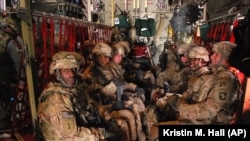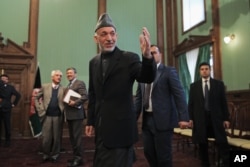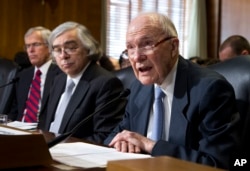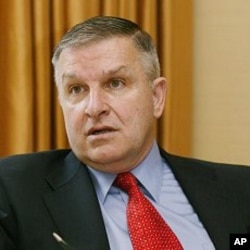WASHINGTON —
After 12 years of fighting in Afghanistan, America’s longest war is coming to an end. By the end of this year, all U.S. combat personnel will be out of the country.
The question facing U.S. officials is what kind of a residual force - if any - will remain. That force would continue training Afghan military and security forces and sustaining counterterrorism operations against al-Qaeda.
Brent Scowcroft was national security adviser to two U.S. presidents, Gerald Ford (1974-77) and George H.W. Bush (1989-93). He said a minimum of 10,000 troops are needed to - in his words - give a sense of reassurance to the Afghan military.
“We’ve made great progress in building an Afghan military that can keep the country together - but they have also operated sort of under the wisdom of the U.S. advisers,” said Scowcroft. “I think what they need is just enough of a force there, just to give them a sense of confidence that we’re still there.”
Karzai does not sign key accord
Afghan President Hamid Karzai has refused to sign a Bilateral Security Arrangement with the United States for a residual U.S. force. His term as president expires in April and many experts say the Obama administration will have to deal with Karzai’s successor.
U.S. officials have said that if Karzai does not sign the accord, that would force the U.S. military to withdraw all its troops from Afghanistan - the so-called “zero option.”
Former U.S. ambassador to the United Nations John Bolton is against the “zero option.”
“And if that happens, I’m afraid it is simply a matter of time before Taliban and al-Qaeda take control again. And if that were to happen, that would be a tremendous loss. And not only because it would give Taliban and al-Qaeda once again a base of operations as they used to plan the 9/11 attack,” said Bolton, “but it would strengthen the hand of radicals like the Pakistani Taliban and other terrorist groups next door who could put the fragile government of Pakistan at risk.”
Tense relations between Washington and Kabul
Over the past several years, President Karzai has been increasingly critical of the United States. Many experts say the partnership between Washington and Kabul is strained - and Karzai’s reluctance to sign a bilateral security arrangement is just one example of the tense relations between the two governments.
Retired Marine Corps General Anthony Zinni, former head of U.S. Central Command (1997-2000) says Karzai has been an erratic ally.
“He’s been an up and down ally - it’s been schizophrenic. There are times when he seems to be willing to work together and cooperate in some way - and then there are other times when he just goes 180 degrees in the other direction,” said Zinni, “and sometimes in a very unpredictable fashion. So this has been a roller coaster collaboration since he rose to power and our involvement in there.”
"Mercurial ally"
General Scowcroft puts it this way:
“I would say, to put it mildly, he’s been a mercurial ally. We’ve invested a lot in Karzai and he has paid off in some ways - and in other ways he’s been a great disappointment. Unfortunately, we don’t control Karzai. Exactly what he’s up to, it’s never been clear to me. He always seems to be playing more than one game. He’s there and so we don’t have any choice but to deal with him.”
Ambassador Bolton describes President Karzai as “fickle.” And in dealing with him, Washington must be very clear about the reasons for the U.S. presence in Afghanistan.
“We’re there because it represents a plus for America’s national security interest, to take on terrorists like the Taliban and al-Qaeda at a distance. We’re not there to remake Afghanistan. We’re not trying to turn it into the Switzerland of Central Asia,” said Bolton. “I wish nothing but the best for the Afghan people, but we’re not there to make their lives better - we’re there to safeguard American lives - if we can help the Afghans out in the process, so much the better. But let’s be clear - the more Karzai attacks the United States, the harder it is for us to justify being there.”
General Anthony Zinni said Washington is partly to blame for the deteriorating relationship with Karzai.
“On our side too there have been some issues there. We had 11 commanders in 11 years. You can’t be changing people in and out like that. He [Karzai] hasn’t dealt with a consistent set of leaders in there and the ambassadors have turned over too, significantly.”
General Zinni said what compounds the problem is that personal relationships mean everything in that part of the world - and you can’t build solid relationships with such a turnover in leadership.
The question facing U.S. officials is what kind of a residual force - if any - will remain. That force would continue training Afghan military and security forces and sustaining counterterrorism operations against al-Qaeda.
Brent Scowcroft was national security adviser to two U.S. presidents, Gerald Ford (1974-77) and George H.W. Bush (1989-93). He said a minimum of 10,000 troops are needed to - in his words - give a sense of reassurance to the Afghan military.
“We’ve made great progress in building an Afghan military that can keep the country together - but they have also operated sort of under the wisdom of the U.S. advisers,” said Scowcroft. “I think what they need is just enough of a force there, just to give them a sense of confidence that we’re still there.”
Karzai does not sign key accord
Afghan President Hamid Karzai has refused to sign a Bilateral Security Arrangement with the United States for a residual U.S. force. His term as president expires in April and many experts say the Obama administration will have to deal with Karzai’s successor.
U.S. officials have said that if Karzai does not sign the accord, that would force the U.S. military to withdraw all its troops from Afghanistan - the so-called “zero option.”
Former U.S. ambassador to the United Nations John Bolton is against the “zero option.”
“And if that happens, I’m afraid it is simply a matter of time before Taliban and al-Qaeda take control again. And if that were to happen, that would be a tremendous loss. And not only because it would give Taliban and al-Qaeda once again a base of operations as they used to plan the 9/11 attack,” said Bolton, “but it would strengthen the hand of radicals like the Pakistani Taliban and other terrorist groups next door who could put the fragile government of Pakistan at risk.”
Tense relations between Washington and Kabul
Over the past several years, President Karzai has been increasingly critical of the United States. Many experts say the partnership between Washington and Kabul is strained - and Karzai’s reluctance to sign a bilateral security arrangement is just one example of the tense relations between the two governments.
Retired Marine Corps General Anthony Zinni, former head of U.S. Central Command (1997-2000) says Karzai has been an erratic ally.
“He’s been an up and down ally - it’s been schizophrenic. There are times when he seems to be willing to work together and cooperate in some way - and then there are other times when he just goes 180 degrees in the other direction,” said Zinni, “and sometimes in a very unpredictable fashion. So this has been a roller coaster collaboration since he rose to power and our involvement in there.”
"Mercurial ally"
General Scowcroft puts it this way:
“I would say, to put it mildly, he’s been a mercurial ally. We’ve invested a lot in Karzai and he has paid off in some ways - and in other ways he’s been a great disappointment. Unfortunately, we don’t control Karzai. Exactly what he’s up to, it’s never been clear to me. He always seems to be playing more than one game. He’s there and so we don’t have any choice but to deal with him.”
Ambassador Bolton describes President Karzai as “fickle.” And in dealing with him, Washington must be very clear about the reasons for the U.S. presence in Afghanistan.
“We’re there because it represents a plus for America’s national security interest, to take on terrorists like the Taliban and al-Qaeda at a distance. We’re not there to remake Afghanistan. We’re not trying to turn it into the Switzerland of Central Asia,” said Bolton. “I wish nothing but the best for the Afghan people, but we’re not there to make their lives better - we’re there to safeguard American lives - if we can help the Afghans out in the process, so much the better. But let’s be clear - the more Karzai attacks the United States, the harder it is for us to justify being there.”
General Anthony Zinni said Washington is partly to blame for the deteriorating relationship with Karzai.
“On our side too there have been some issues there. We had 11 commanders in 11 years. You can’t be changing people in and out like that. He [Karzai] hasn’t dealt with a consistent set of leaders in there and the ambassadors have turned over too, significantly.”
General Zinni said what compounds the problem is that personal relationships mean everything in that part of the world - and you can’t build solid relationships with such a turnover in leadership.








